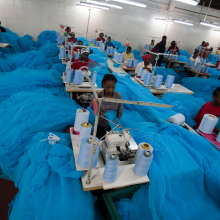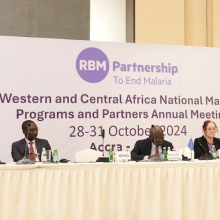20 years ago, visionaries led by then WHO Director General Gro Harlem Brundtland and the late United Nations Secretary General Kofi Annan, alongside UNICEF, UNDP and the World Bank, came together to create one of the first public private partnerships – the Roll Back Malaria Partnership – with the audacious goal of “rolling back malaria” and cutting malaria deaths in half in 10 years. At that time, more than 1 million people were dying every year from malaria and a child was dying every minute from this preventable disease.
Over the past two decades, RBM has facilitated the incubation of new ideas, extended support to innovative approaches, promoted high-level political commitment and kept malaria high on the global agenda by enabling, harmonizing and amplifying country ownership and partner-driven advocacy initiatives.
Today, this partnership, known as the RBM Partnership to End Malaria, is the largest global platform for coordinated action towards a world free from malaria, which has grown to more than 500 partners today—from community health worker groups and researchers developing new tools, to malaria-affected and donor countries, businesses and international organisations.
Since its creation, thanks to the efforts of RBM Partners, we have seen a more than 1,000 percent increase in malaria funding, the scaling up of lifesaving interventions, including the distribution of over one billion insecticide-treated bed nets in Africa, and the introduction of innovative tools such as rapid diagnostic tests.
Since 2000, these efforts led to one of the most successful global health stories and investments of our time, with more than seven million lives saved, over one billion cases of malaria prevented, and the addition of US$2 trillion to the economies of malaria affected countries. Today, thanks to this global partnership, we’re saving half a million lives per year from malaria.
This historic success prompted a shift in global ambition – from just “rolling back” malaria to ending it for good.
But our work isn’t done. A child still dies every two minutes from malaria and malaria cases are on the rise for the first time in more than a decade.
This week, on the occasion of our 20th anniversary, I wish to congratulate all RBM Partners around the world who are responsible for the tremendous progress made by this global partnership in the last 20 years. While we know progress is not inevitable, success is possible. And, we look to all of you to continue to play a key role in writing the history of malaria in the next 20 years.
Latest Blogs


